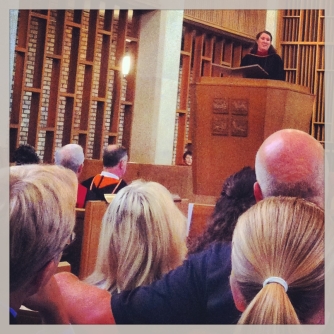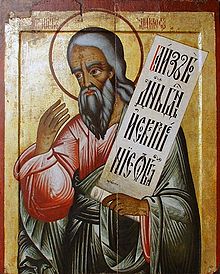Texts: Acts 2:1-21 + Psalm 104:24-34,35b + Romans 8:14-17 + John 14:8-17,25-27

A little over a week ago, Kerry and I were in Nashville, Tennessee to see my eldest god-daughter, Katie Russell, graduate from seminary at Vanderbilt Divinity School. You can imagine that for a preacher and pastor like myself, there’s a special pride in watching your godchild graduate from seminary.
The night before the actual graduation, at the baccalaureate service, I got the added pleasure of hearing Katie give her testimony before her colleagues and her faculty. She was one of a handful of students invited to do so at this closing worship service for a cohort of newly minted pastors who were preparing to be sent out into the world.
As she opened her remarks she used a phrase that was repeated over and over during the weekend. Referring to her soon-to-be alma mater she said, “here at the School of the Prophets we learned…” School of the Prophets, I soon learned, wasn’t just a compliment being paid by a student to her teachers, or a preacherly turn of phrase, it is part of that school’s self-concept. Just as so many schools have Latin mottos (the University of Chicago’s is Crescat scientia; vita excolatur or “Let knowledge grow from more to more; and so be human life enriched;” Harvard’s is more simply veritas, or “truth”), the Divinity School of Vanderbilt University names itself in its foundational documents dating back to the 1870s a Schola Prophetarum, a school of prophets.
It’s a name the school takes seriously. Its mission statement names as one of the school’s primary goals that they will “prepare leaders who will be agents of social justice” who will be “forceful representatives of the faith and effective agents in working for a more just and human society that will help to alleviate the ills besetting individuals and groups.” The graduation program had a full-page description of the Divinity School’s commitments that explicitly state its opposition to racism, sexism, homophobia, anti-Semitism, poverty, militarism and the destruction of the environment.
Still, there was something jarring about hearing a group of people refer to themselves so boldly as the “School of the Prophets.” Maybe its my midwestern upbringing, but it just felt like bragging. How could they be so bold? Who died and named them prophets?
Well, as it turns out, Jesus did.
Growing up I thought a prophet was like a fortune-teller, a kind of biblical palm reader who could see the future. It probably wasn’t until seminary that I myself was asked to really thoroughly read the prophetic books of the Hebrew scriptures, what we sometimes call the “Old” Testament. The prophets of the bible sometimes spoke of future things, but just as often spoke to the present moment. What made them prophets wasn’t that they told the future, but that they told the truth. God’s truth.
Jesus — the one who lived, and died, and is rising in the world by the power of the Holy Spirit — says to his disciples shortly before his crucifixion,
“If you love me, you will keep my commandments. And I will ask the Father, and he will give you another Advocate, to be with you forever. This is the Spirit of truth, whom the world cannot receive, because it neither sees him nor knows him. You know him, because he abides with you, and he will be in you. I have said these things to you while I am still with you. But the Advocate, the Holy Spirit, whom the Father will send in my name, will teach you everything, and remind you of all that I have said to you.” (John 14:15-17,25-26)
And, indeed, Jesus is a man of his word. Throughout these fifty days since Easter morning we have been hearing the stories of the Acts of the Apostles. We’ve been recalling to ourselves the legacy of a church born in the moment when the Holy Spirit was poured out on those first followers of Jesus, huddled together for safety in the face of a scary world, but filled with power and purpose and sent out for the sake of restoration of God’s good creation.
God’s Holy Spirit fills the church, just as Jesus said it would, and when it does, Peter, their first preacher, remembers the words of another prophet, Joel, who said,
“In those last days it will be, God declares, that I will pour out my Spirit upon all flesh, and your sons and your daughters shall prophesy…” (Acts 2:17a-b)
In that moment of the church’s birth, Peter acts as a prophet, telling God’s truth that the last days are here. The new heaven and the new earth are breaking into the ones we have known for too long. Salvation is for here and now. It has already begun, and we who are flesh, we who are sons and daughters and heirs with Christ to the fortunes of God’s love are called to act, like the apostles.
Looking back at the Vanderbilt graduation, I can see that I was mistaken. Or, I wasn’t hearing that phrase, “school of the prophets,” correctly. My midwestern aversion to pretense was bristling against the notion that these people were calling themselves prophets, when all they were really claiming to be was a school. Because, you see, by the power of the Holy Spirit, we have all been made prophets.
By the power of the Holy Spirit, we are all called to speak God’s truth to a world burdened by lies. By the power of the Holy Spirit, we are all called to dream incredible dreams and given eyes to see a vision of a future reality breaking into the present moment, a vision that makes these “the last days.”
As prophets, all of us, we need schools and churches and so many other places where we can learn about the legacy of which we are inheritors. We need Sunday School teachers and small group leaders, seminarians and people to lead the adult education hour. We need parents and grandparents, aunts and uncles and godparents who will teach us and shape us as we grow into our prophetic callings. We need community organizers and event planners to call us to action and to put us to use. We need faithful servants who fill grocery bags and glean the leftover food waiting in fields both near and far.

This is our school of the prophets, one of many God has built in the world, made of living stones. We are its faculty and we are its students. As we move out of the season of Easter and into the long summer of “ordinary time,” we’ll actually be reading the stories of the Hebrew prophets — Elijah and Elisha, Amos and Hosea, Isaiah and Jeremiah. We’ll remember how God’s people have been called to tell God’s truth to every age, as we live into our own prophetic calling to act.
This call, the call to action, is daunting to be sure, but we are kept in the promise that we will be filled with the power and the presence of the one who has made us prophets: Jesus, God’s Beloved, rising in the world by the power of the Holy Spirit.
As we commence upon this journey, some of us joining this congregation today, others saying goodbye, all of us being sent for a greater purpose, I want to offer you these words — often attributed to Oscar Romero, but believe to have been written by the Roman Catholic bishop Kenneth Untener of Detroit:
It helps now and then to step back and take a long view. The kingdom is not only beyond our efforts, it is even beyond our vision.
We accomplish in our lifetime only a small fraction of the magnificent enterprise that is God’s work. Nothing we do is complete, which is another way of saying that the kingdom always lies beyond us.
No statement says all that could be said. No prayer fully expresses our faith. No confession brings perfection. No pastoral visit brings wholeness. No program accomplishes the Church’s mission. No set of goals and objectives includes everything.
This is what we are about: We plant the seeds that will one day grow. We water seeds already planted, knowing that they hold future promise. We lay foundations that will need further development. We provide yeast that produces effects far beyond our capabilities.
We cannot do everything, and there is a sense of liberation in realizing that. This enables us to do something, and to do it well. It may be incomplete but it is a beginning, a step along the way, an opportunity for the Lord’s grace to enter and do the rest.
We may never see the end results, but that is the difference between the master builder and the worker. We are workers, not master builders; ministers, not messiahs.
We are prophets of a future not our own.
Amen.
One thought on “Sermon: Sunday, May 19, 2013: Day of Pentecost”